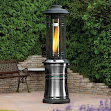When is hot too hot in the Workplace?
Employers have a legal obligation to
provide a ‘reasonable’ working temperature which is covered by the Workplace(Health, Safety and Welfare) Regulations 1992.
Safe
working temperatures are important in any work environment.
Excess
heat can cause drowsiness which could lead to mistakes or unfinished work. High
temperatures can also cause heat stress and other health problems. Heat stress
occurs when the body’s means of controlling its internal temperature starts to
fail. As well as air temperature, factors such as work rate, humidity and
clothing worn while working may lead to heat stress.
Maximum Temperatures
Surprisingly
there is no legal maximum safe working temperature - the only requirement is
that workplace temperatures in buildings should be ‘reasonable’. (Workplace
Regulations 1992). A meaningful maximum figure cannot be given due to the high
temperatures found in, for example, bakeries, glass works or foundries. In such
environments it is still possible to work safely provided appropriate controls
are present. Factors other than air temperature, ie radiant temperature,
humidity and air velocity, become more significant and the interaction between
them become more complex with rising temperatures.
According
to the TUC, during hot summers employees are more prone to trip or slip and
staff working with computers often suffer from stress, tension and tiredness. For manual workers, working in hot conditions
can cause fainting, dizziness and cramps and for some workers the heat can
affect lungs and hearts, eg cause asthma, throat infections or rhinitis.
As
there is no legal ruling, the TUC recommends maximum safe working temperatures
of 27ºC for manual workers, and 30ºC for
sedentary workers.
Controlling High Temperatures
In
an office, employers may be able to keep the maximum temperature below 30ºC
with suitable ventilation and shades. Employers can also make staff more
comfortable by allowing a sensible dress code and by ensuring there are regular
breaks for cooling drinks.
Suitable
ventilation can take the form of air conditioning, open windows and fans which
can help to keep the air fresh. Stuffy air interferes with workers’
concentration, and can raise the temperature to uncomfortable levels. If you have a cooling system orunit, then keep the windows closed so that the air conditioning units work
effectively.
If
employers use air conditioning, they need to ensure it is regularly serviced and maintained by a qualified engineer.
Poor functioning air conditioning can actually increase the temperature
rather than lower it. London Cool recommends keeping your
air conditioning maintained throughout the winter to ensure it will work when
you really need it. In addition, keeping
to a planned maintenance schedule not only ensures your air conditioning is working
at optimum levels, it will comply with a manufacturer’s extended parts
warranty.
London Cool has a selection of
portable air conditioners and evaporative coolers for hire. These cooling units are invaluable in
controlling the temperature in a variety of environments and are used in many
sectors such as manufacturing, healthcare, events, theatres, exhibition spaces,
museums, retail, hotels, server rooms and data centres, schools and colleges.
Why not give our sales team a call
and find out how we can help – 0800 440 444 - visit our website www.londoncool.com, Like us on Facebook or Follow
us on Twitter
https://www.gov.uk/workplace-temperatures

I believe there are many more pleasurable opportunities ahead for individuals that looked at your site.nebosh course in chennai
ReplyDeleteI enjoy what you guys are usually up too. This sort of clever work and coverage! Keep up the wonderful works guys I’ve added you guys to my blog roll.
ReplyDeleteoccupational health and safety course in chennai